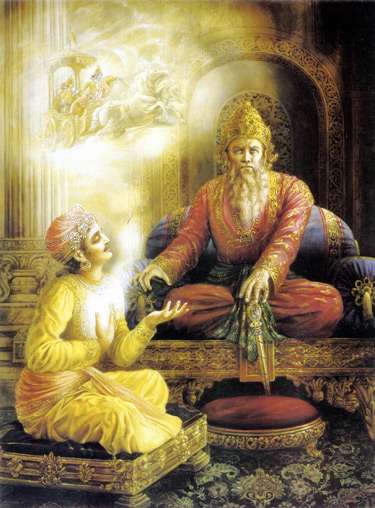When Dhritarastra introduced his welcome speech in paternal ways, Yudhisthira could not help but catch a glimpse of false expressions. However, he replied without resentment, hiding his concern about the proposals that his uncle would later make. For him, the most important thing was to put an end to an argument that had been going on for too long now, so, he would accept anything at that moment as long as he and his brothers were not excluded from their birth rights.
Dhritarastra’s oratory was long and full of courteous words, until the crux of the matter was reached: the possession of the territories.
“You, Yudhisthira, are the eldest of my children and Pandu, and therefore the whole territory that has always been our ancestors would be entitled to you. But, because you want to rule and Duryodhana wants it too, I couldn’t find valid arguments to convince him otherwise. On the other hand, he is afraid that you want to deprive him of this perspective so much that this feeling over the years has turned into hatred. I believe it is wise to please everyone by dividing the kingdom, so that on the one hand you will reign you, and Duryodhana on the other. This is my proposal; meditate on it and then tell me what you think.”
Accepting this suggestion would have meant for Yudhisthira to deprive himself of part of his empire, but he was thrilled with the idea. All the righteous men present at the assembly applauded.
“We accept your proposal as if it were an order from our own father,” said Yudhisthira. “The only thing we want is to carry out our natural duties as rulers in peace. If the division of the kingdom can ensure this and avoid an armed conflict, we are happy to take only half of it.”
Then, Dhritarastra said:
“All the territory that extends southwest of Hastinapura will be yours, while everything else will remain to Duryodhana.”
At these words no one was able to restrain a tremor of anger; it was no mystery to anyone that the region entrusted to the Pandavas was practically a desert, with no large cities, no water, no vegetation, while the area destined for Duryodhana was the most flourishing and developed.
Dhritarastra tried to trick them, but strangely neither Yudhisthira nor Krishna said anything, and the others were silent as well. The son of Dharma accepted with kind words, giving heartfelt thanks.
That same day, in the holy presence of Vyasa, Yudhisthira was crowned king. A few days later, the Pandavas left for their territory.
The capital of the kingdom was Khandava-prastha, a small city which in the past had been the capital of the Kurus. It had once been so opulent and prosperous that the saying “rich like Khandava-prastha” was still common. It happened that one day a Rishi hurled against it a disastrous curse that caused it to deteriorate to the point of reducing it to a small town surrounded by a barren desert. At the time, there was nothing to see all around but desolation; for centuries, nothing had grown in that cursed place.
But the Pandavas did not feel discouraged and went to work. The prince of Dvaraka, Krishna, who had eyes so similar to the petals of the lotus flower, in meditation called Indra and asked him to downpour heavy rains in order to make the soil fertile; and indeed, in a few days the entire territory of Khandava was flooded with continuous rains. In honor and thanks to the Deva, the capital would later be called Indra-prastha.
Then, Krishna called Vishvakarma, to whom he asked to build wonderful cities with beautiful palaces, fountains, and lawns.
The news that something incredible was happening in Khandava began to draw many people and even numerous Devas, all eager to contribute to the realization of the fantastic kingdom of the Pandavas.
Soon after, what was an expanse of arid terrain began to be transformed into a place full of greenery with rivers, lakes, and fantastic cities.
The incredible news concerning the new empire of the Pandavas spread quickly and floods of people, coming from all over the world, came, sure that in the kingdom of the virtuous brothers they could live without material or spiritual deprivation. Soon, Khandava-prastha swarmed with citizens.
The day of the inauguration arrived.
Vyasa himself and many other sages with a heart devoid of any attachment to this world came personally to direct the ceremony and to recite auspicious Vedic mantras.
When all was finished, Krishna and the Vrishni took their leave and returned to Dvaraka. Many in Indra-prastha knew who Krishna was and loved him with their whole being, so when they left, they felt like they were abandoned. But in their minds, He was always present.
For the Pandavas, a new life of serenity began; the terrible times of Varanavata seemed to have passed thousands of years ago.
This is a section of the book “Maha-bharata, Vol. 1”.
To buy the complete book, click above
Post view 425 times



